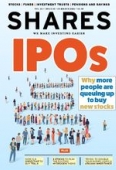Archived article
Please note that tax, investment, pension and ISA rules can change and the information and any views contained in this article may now be inaccurate.
Missed the rush on an IPO? Wait for a pullback before buying

With more than 2,000 stocks listed on the London Stock Exchange and thousands more on markets overseas, one might have thought there is no need to fuss about more companies deciding to float on a stock exchange and offer their shares for the public to buy.
What actually occurs is a fascination with new names coming to market as investors are eager to see if any of these companies have a compelling story, such as providing products or services in strong demand.
Some investors rush to get involved, believing the best gains are made early on. Others like to sit back and wait for this initial flurry to play out.
As we mention in this week’s in-depth look at IPOs – offering shares to the public for the first time – you often see short-term traders get in and out in a matter of days or weeks, only to be replaced by more serious longer-term investors.
If a stock has already shot up as the market opens on the first day of dealings, it can often pay to wait for the fuss to die down before thinking about taking a position. For example, Dr Martens (DOCS) listed at 370p on 29 January and just over a week later it had jumped to 513p. It then didn’t take long before the shares began falling – at the time of writing they were trading 12% below their peak at 449p.

An IPO is often the first chance for directors to realise value in shares they may have bought when the business was privately owned or earned as part of their remuneration package.
In many cases, these shares weren’t tradeable until the company joined the stock market and so it doesn’t seem too bad that directors sell a few at IPO or later.
Check to see how much stock they’ve got left after selling – it’s not a good sign if it’s less than half of what they previously owned. Ideally, we want to see directors remain investors as their interests will be aligned with other shareholders.
A company must make stock available to be able to start trading on the market. That either comes from existing shareholders or backers selling some of their holding or the company issuing new shares to raise money at the IPO.
Backers pre-IPO may include private equity firms and they typically see a stock market listing as an exit route, either selling all their stock at the flotation or within a year or two afterwards.
Dr Martens’ management, directors, employees and some former executives are not allowed to sell their shares for at least a year after its IPO, while other stakeholders including private equity group Permira will be locked in for 180 days.
Some investors worry about a share overhang, when you know there is likely to be a large swathe of pre-IPO investors getting out as soon as restrictions are lifted.
If the business is doing well, these shares will easily be mopped up by others. Big blocks of shares tend to be sold to one or more institutional investors via a share placing so you won’t have a slow and painful trickle of stock being dumped on the market.
Important information:
These articles are provided by Shares magazine which is published by AJ Bell Media, a part of AJ Bell. Shares is not written by AJ Bell.
Shares is provided for your general information and use and is not a personal recommendation to invest. It is not intended to be relied upon by you in making or not making any investment decisions. The investments referred to in these articles will not be suitable for all investors. If in doubt please seek appropriate independent financial advice.
Investors acting on the information in these articles do so at their own risk and AJ Bell Media and its staff do not accept liability for losses suffered by investors as a result of their investment decisions.
Issue contents
Exchange-Traded Funds
Feature
- Now is a good time to take a stake in Tesla
- Hacking attacks could see surge in cyber insurance claims
- Trying to double your money using a £50,000 inheritance
- Vodafone-backed Vantage Towers: it’s all about the income
- Three IPOs to buy and the names coming soon
- Why supermarkets won’t be shaking over Amazon Fresh
- How to get involved in IPOs
- 3 stocks to play the exciting hydrogen theme
 magazine
magazine








